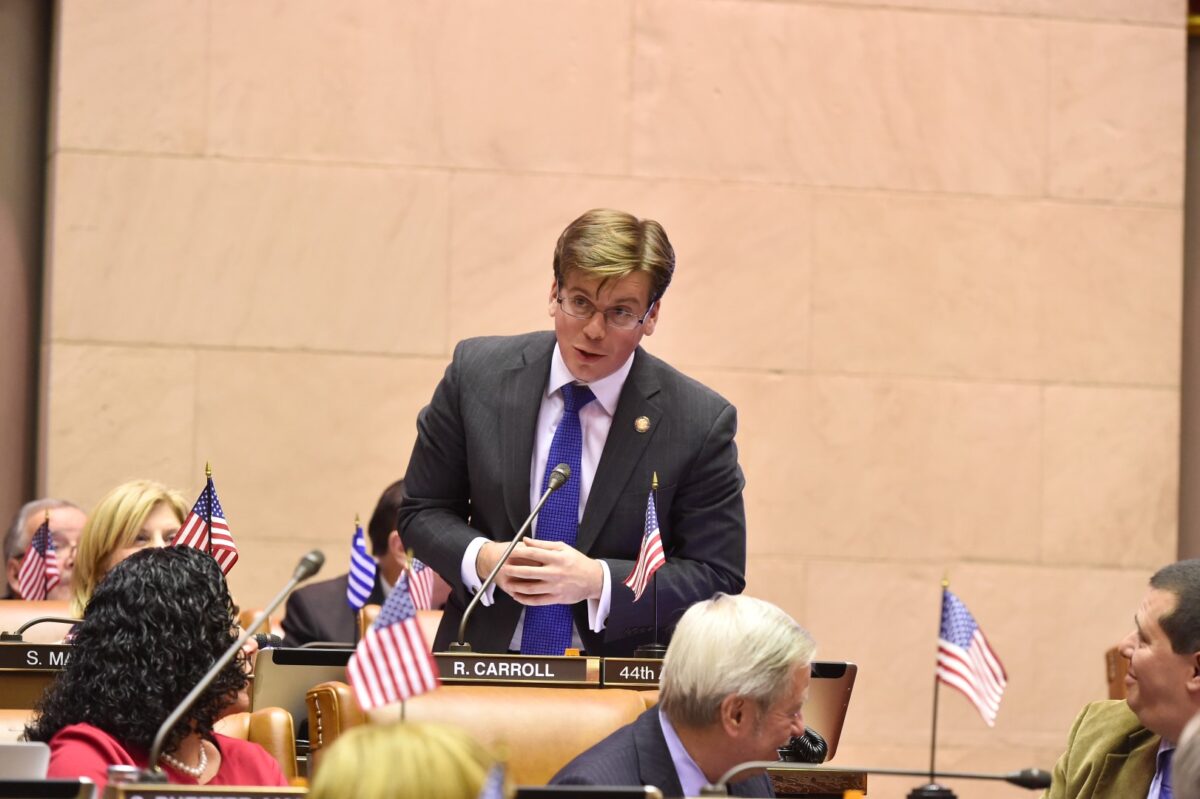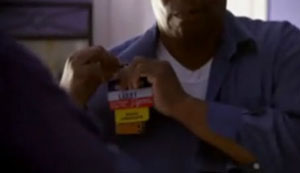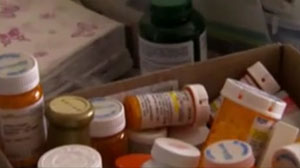I’ve spent the last two days trying to tame a great rage I have towards an entitled millennial New York State Assemblyman named Robert Carroll — or “Bobby4Brooklyn,” as this clueless asshat likes to call himself on Twitter. (Sorry, Bobby, but styling your handle like the title of a Prince song doesn’t make you any less whiter.) But I cannot find it within my heart to stifle my indignation towards a remarkably insensitive and entitled dickhead who clearly does not recognize the struggles of people with disabilities, economically disadvantaged New Yorkers who are hanging by a thread for dear life, and the elderly, who are often barely getting by on social security and pensions. Carroll has proposed one of the cruelest and most poorly devised bills I’ve observed in some time. And this dimwitted weasel has the effrontery to call himself a Working Families Party candidate!
In the middle of a pandemic, as many people have been forced to stay indoors and remain socially isolated and thus order packages to get what they need, Carroll has had the audacity to propose a $3 surcharge for any delivery in New York City. The bill — specifically, A06078 — does provide an exception for “essential medical supplies, food deliveries and for those using supplemental nutrition assistance program, special supplemental nutrition for women, infants and children and any other successor program,” but this still leaves a woefully gargantuan set of essential items that will still cause the underprivileged to pay up. Got a deal on a winter coat? Pay $3. Or how about some household goods you need to keep your home in tidy shape? Pay $3. Need a specialized tool for your job that you can’t get elsewhere? Pay $3. Your landlord won’t fix the radiator and you need a heater to stay warm in the winter? Pay $3.
You may be thinking, “Well, $3. That’s not that big of a deal.” Well, how many times have you been forced to order something online when it isn’t available in the store? Or when you’ve feared braving the teeming throngs of people crowding a supermarket? Moreover, if Amazon decides to split up your delivery across multiple packages, would you have to pay $3 for each separate delivery? That would seem to be the case based on the language of the bill. You could easily pay $12 if the algorithm decided to split up a bulk purchase into four separate deliveries. And for many people struggling in New York, $12 could mean the difference between paying this month’s electricity bill or playing Russian roulette with Con Ed, hoping that they won’t shut the lights off after months of falling behind on the payments.
This bill is also a slap in the face to small businesses, who are often forced to shell out for UPS and FedEx in an effort to keep their customers happy and fend off the big online behemoths. Amazon has succeeded in undercutting small businesses by pricing down goods at a reduced profit margin. The cash-strapped New Yorker is often forced to go with the cheaper deal. But what if that $3 surcharge — theoretically on every item — is simply too much for someone looking for loose change under the couch to stay alive? Well, they may go to the retail stores. They could clog the parking lots, creating the very congestion that Carroll, in his infinite imperiousness, claims to be fighting.
Our fundamental goal here in New York is to prevent people from socially congregating as much as possible. According to the Washington Post, social gatherings are leading the COVID spread. The spread has been so disastrous that Governor Cuomo was forced to cap social gatherings at ten people. Moreover, in an age in which three dollars is the new thirty dollars, Carroll’s bill is a repugnant war on the working class. All the funds generated by this would go to bailing out the MTA — which, not to put too fine a point on it, hasn’t exactly been known for its financial scrupulousness. Disabled people — who rely on deliveries in order to survive and who cannot use the subway easily due to the fact that only 77% of stations are accessible — are now being asked to bear the financial brunt of a public transportation service that has declared itself enemy to their mobility. And what about the immunocompromised? Surely, it’s an unfair financial burden on them as well.
Carroll clearly hasn’t thought out these obvious drawbacks to his bill. The $300 million he hopes to generate annually from a bill aimed at regular people would be a drop in the bucket for Amazon, which Carroll hasn’t targeted and which made $96.1 billion in revenue during the third quarter of 2020. If you asked Amazon to pick up the $30 million tab, that would be .3% of just one quarter of revenue. For the struggling New Yorker who has only $90 to buy an $89 winter coat, that would mean a $92 bill that he could not pay.
Robert Carroll is, in short, a heartless Scrooge for even considering this punitive scheme. He has received righteous pushback on Twitter and is too much of a cowardly Jacob Frey type to man up and address the criticism and walk back the bill. Since social media opened up a glorious can of whoop-ass on Carroll and his foolish and unjust bill, Carroll has tried to mask his assault on the working class by aligning himself with a “tax the rich” campaign and hypocritically stumping against state pension dollars divested to gas an doil.
Well, it won’t work, Bobby. We now know that you’re an enemy of the people. We know that you’re a Scrooge and that you’re actively contributing to undermining public health during a pandemic.
If Carroll manages to pass this bill, here is my promise. I will put my energies into supporting any 44th District candidate who will primary him. I will knock on doors to expose this charlatan and tilt votes. I will do everything in my power to ensure that Carroll loses his seat.
Asking the people — especially disabled people who cannot use the subway — to take a tax hit for a corrupt and bloated agency that requires significant reform is an unconscionable and morally unjust act. You surrender any right to call yourself a defender of the people when this bill is your “big idea.”
So what’s it going to be, Bobby? Are you going to walk this vile bill back and admit that you did not think this thing through? As a man of Brooklyn, I will be the first person to defend you if you do so.
Or will you continue to remain smug and stubborn? Will you continue to believe that you know what’s best for the people of Brooklyn? If that’s the case, I’ll be happy to volunteer my time and energy to become a significant factor to ending your political career with a sizable turnout in the next election.
The choice, Bobby, is yours.



 While it is true that Obama advocates the federal government negotiating with the drug companies to reduce prices under the Medicare Part D drug program (similar to what the Department of Veteran Affairs now gets), permitting citizens to purchase prescription drugs from outside of the United States, and closing the doughnut hole, let’s consider why this policy was effected in the first place. The MMA came into being because of rising costs in prescription drugs and the inability of the federal government to allocate enough funds to pay for it. What we have here is a scenario in which
While it is true that Obama advocates the federal government negotiating with the drug companies to reduce prices under the Medicare Part D drug program (similar to what the Department of Veteran Affairs now gets), permitting citizens to purchase prescription drugs from outside of the United States, and closing the doughnut hole, let’s consider why this policy was effected in the first place. The MMA came into being because of rising costs in prescription drugs and the inability of the federal government to allocate enough funds to pay for it. What we have here is a scenario in which  Which puts the government in the awkward position of going overseas to import its drugs for Medicare. But if Medicare’s chief drug source comes from another country, how then can the FDA provide the essential oversight for the drugs? This leaves the government coming back to the pharmaceutical companies with its tail between its legs. I’ve looked around numerous places, but Obama has not specified how he can “negotiate” with these draconian realities in place. But to his credit, he did
Which puts the government in the awkward position of going overseas to import its drugs for Medicare. But if Medicare’s chief drug source comes from another country, how then can the FDA provide the essential oversight for the drugs? This leaves the government coming back to the pharmaceutical companies with its tail between its legs. I’ve looked around numerous places, but Obama has not specified how he can “negotiate” with these draconian realities in place. But to his credit, he did